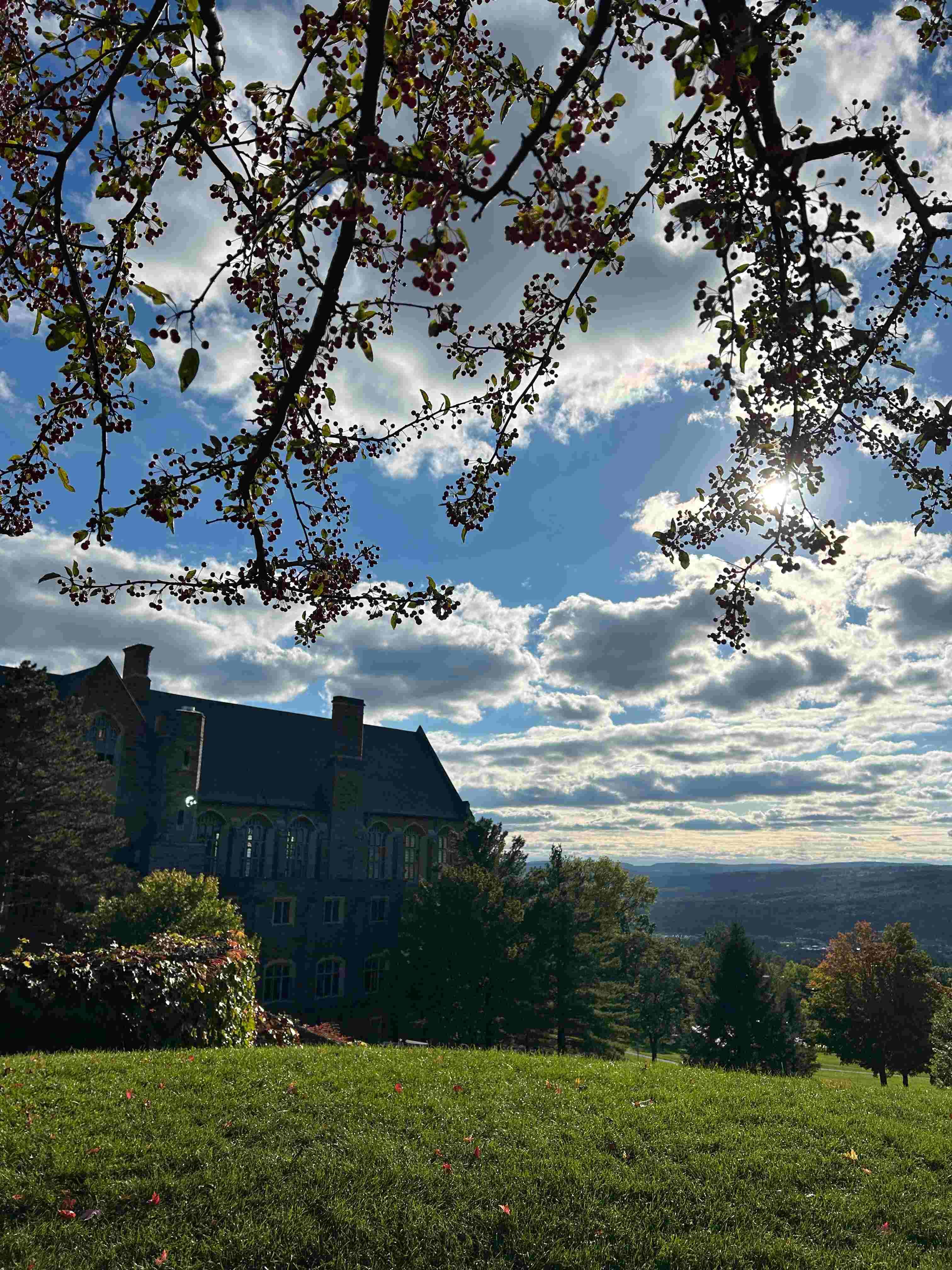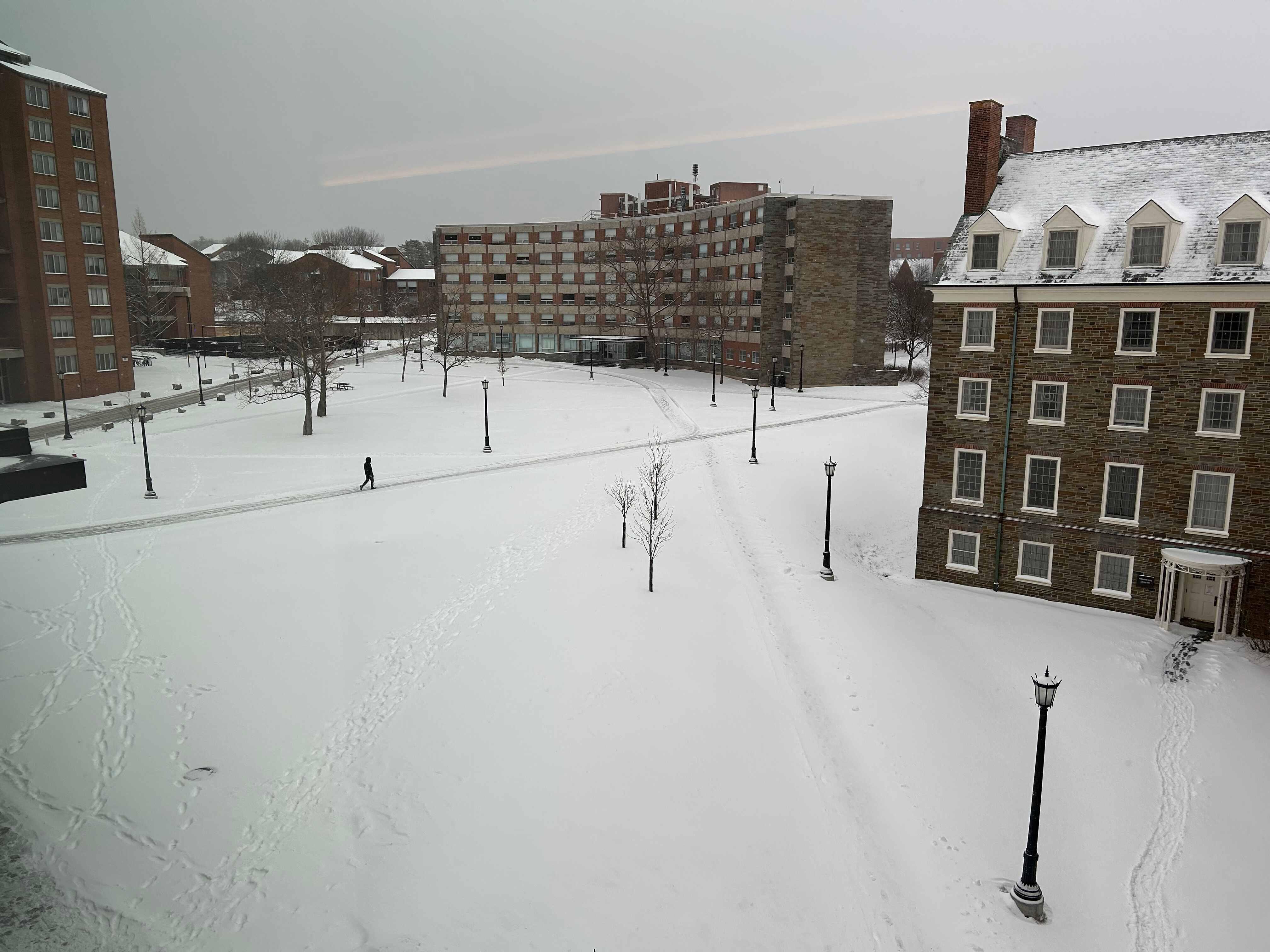What Students Say
Likes
- I really liked the culture of my college (the cultural activities and people)
- The job opportunities that have been provided
- Love the career services where they help me with reviewing my resume
Dislikes
- Some professors would overload us with work so it gets really stressful
- I don't like the fact that its very far away from NYC so I miss out on some networking events
- There could be more stress relieving activities due to the amount of stress because of finals and prelims
Course Curriculum
- Overall, the difficulty level is high due to the immense competition and the level of difficulty of the content. It's usually a mixture of both theoretical and practical for engineering and for business, it's more towards the theoretical side. Usually, the engineering classes have labs for practical applications, which I really like.
- It depends on the semester but usually I have 3-4 classes per day, each about 50 to 75 minutes. They usually start around 10:00 AM and can go on until the late afternoon, depending on the day. Lab sessions, office hours, and group meetings often fill up the rest of the day.
- Introductory or core courses can have 300+ students, but upper-level electives are more intimate, with 100-150 students.
- I don't know the exact number of Indian students but Cornell has a significant Indian student community, especially in STEM and business-related fields.
Admission Experience
- I applied to the University Of Toronto (Admitted), Purdue University (Withdrawn), Ohio State University (Withdrawn), the University of Illinois Urbana-Champaign (Withdrawn), UC Berkeley (Withdrawn), UCLA (Withdrawn), UC Davis (Withdrawn), and Cornell University (Admitted - Early Decision). I have mostly withdrawn applications due to the early decision agreement so I didn't receive any rejections or acceptances.
- My dream was to get admitted to an IVY League and Cornell University was one of the top schools for Engineering and Computer Science. The eligibility criteria were SAT and IELTS (I am not too sure of the minimum requirements but I got a 1440 in SAT and 8.0 in IELTS so I met the requirement). The overall admission process was pretty smooth, as it was an early decision application so I didn't have to apply to a lot of universities.
- I applied for Early Decision to Cornell University in October. The factors that influenced my decision to apply early to Cornell were because it's one of the top ivy league schools for computer science and engineering, and I was also interested in exploring business and Cornell had one of the top business schools too. Also, the research and project team initiatives are also something that attracted me towards Cornell.
- Timeline:
- August: I started writing my college essays for application. I wanted to start off early, as I knew I would have to make multiple drafts and keep editing my essay to ensure it was perfect.
- September: I finalised my college list, gathered letters of recommendation, and kept editing my essays based on feedback.
- Early October: I submitted my application under Cornell's Early Decision plan.
- Mid to Late October: I completed any additional requirements, such as supplemental documents (transcripts – mainly the midterm transcripts after submitting the application).
- December: I received my admission decision and was accepted into Cornell University.
Faculty
- The average faculty-to-student ratio is 12:1 in the college of engineering; however, some CS-specific classes have a lot of faculty members due to the large size. Usually for engineering classes, the teaching methodology involves lectures and discussions every week with assignments that are due every week too.
- The course content isn't completely sufficient to prepare for securing a job, as you have to do your own research and learning along the way to secure a job. The career services is a resource that helps in this search and some faculty members also help out by offering guidance. One faculty member who stands out to me is Arnab Basu because he often brings in real-world case studies when teaching the concepts.
Campus Life
- Cornell Tech – Located in Roosevelt Island, New York City
- Weill Cornell Medicine – Based in Manhattan, NYC
- Weill Cornell Medicine – Qatar
- Libraries: Cornell has an impressive library system with over 20 libraries, including Olin Library (usually open until 12:00 am on weekdays) and Uris Library (a beautiful, historic study space open 24/7).
- Sports Facilities: The Teagle Hall, Bartels Hall, and Lynah Rink host facilities for swimming, basketball, rock climbing, ice hockey, and general fitness. Outdoor sports fields and a scenic running route around Beebe Lake add to the active lifestyle.
- Medical Services: Cornell Health provides comprehensive medical, mental health, and counselling services.
- Dining & Housing: With dining halls like Risley, Keeton, and North Star .
- Slope Day: Cornell’s end-of-year music festival (basically a concert) held on Libe Slope, featuring popular artists and drawing the entire campus community (a free event for undergrads)
- Dragon Day: An architecture student tradition where a massive dragon built by first-years is paraded and “battles” a phoenix built by engineers.
- Clubs & Organisations: There are over 1,000 student-run organisations at Cornell. These include cultural clubs (e.g., Cornell India Association, Asian Pacific Americans for Action), pre-professional societies (e.g., Consulting Club, Women in Computing at Cornell (WICC)), engineering project teams, and debate societies.
Part Time Jobs
- A considerable number of students—especially in STEM and graduate-level programmes—secure TA/RA/DA roles, though these positions are competitive. For undergraduates, TA positions are often offered to upperclassmen or those who have performed exceptionally in a course. The pay for TA positions is usually $15-20/hour.
- Cornell offers various on-campus jobs such as library assistants, dining hall workers, administrative office assistants, IT support, and student centre staff. These jobs usually pay $14 to $20/hour.
- Work Hour Limit: Students on F-1 visas can work up to 20 hours per week during the academic semester and up to 40 hours per week during winter/summer breaks.
- On-campus jobs are moderately competitive—early application and networking help. Positions in high-demand departments (like CS or Econ) are harder to land, while administrative or dining roles are generally more accessible.
- On average, students earn $15–18/hour in part-time jobs, which helps with personal expenses, though not enough to cover full tuition or living costs. Typically, it's not very hard to secure on-campus employment; however, off-campus is really hard to secure due to the increased competitiveness. Application Process: Firstly, you need to search job listings on Handshake or specific company websites. Then, submit applications online with a resume and cover letter tailored to the role (cover letters are usually optional for the application). Then, multiple rounds of interviews if shortlisted, often brief interviews (mostly behavioural) for on-campus roles. Finally, complete paperwork (employment eligibility, etc.) if selected. For part-time work, it's easiest to work on-campus and most Indians try to find an internship over the summer break.
Placement
- Over 90% of students in most programs secure jobs or graduate school admission within 6 months of graduation. The average starting salary for STEM majors is around $80,000–$110,000, while business/economics graduates typically earn between $70,000 and $100,000. Computer science and engineering majors often receive offers in the $100K+ range, especially with top tech firms.
- Usually students find jobs through On-campus recruitment in the Cornell Career Services, summer internships that convert into full-time offers, alumni networking via LinkedIn, and online platforms like Handshake or workday.
- Major companies include Meta, JP Morgan, Amazon, McKinsey, and Bloomberg.
Accommodation
- For the first 2 years I opted for on-campus housing as it was compulsory. For a semester, I have to pay about $7000. I didn't face any challenges, as the process was randomized to assign rooms and I got a single room in a decent hostel for both years so I didn't face any challenges in searching for housing. The accommodation is within the college campus and about 15 minutes walking distance from classes. Most indian students also stay on campus.
Exams
- SAT and IELTS were optional for admission but I submitted those to increase my chances. I also submitted 3 Letters Of Recommendation (2 were required and 1 extra was optional), 2 supplemental essays in the college of engineering, a cover letter, and school transcripts from year 10. There was no interview during the application process so I have no experience.
Fees
- The fees charged are semester-wise; hostel is usually about $7000 for a semester, tuition is about $34,000, a dining hall meal plan is about $3000, health insurance is about $2000 and activity fees are about $200. My monthly expenses are around $75-100, which is spent mostly on food at restaurants around campus with friends or online shopping (I only go out 2-3 times in a month roughly). I use the free bus pass for transportation and rent is included in semester fees.
Scholarship
- I didn't receive any scholarship but my friends received a scholarship (TATA Scholarship), which is about 95% scholarship based mostly on merit but I'm not too sure of the details. Not a lot of people in the university receive scholarships, especially international students. I am not aware of the exact number of students, though, as that isn't revealed to us.





